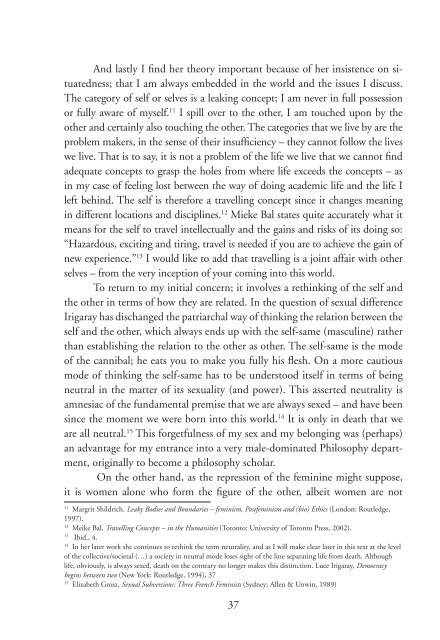Teaching Subjectivity. Travelling Selves for Feminist ... - MailChimp
Teaching Subjectivity. Travelling Selves for Feminist ... - MailChimp
Teaching Subjectivity. Travelling Selves for Feminist ... - MailChimp
You also want an ePaper? Increase the reach of your titles
YUMPU automatically turns print PDFs into web optimized ePapers that Google loves.
And lastly I find her theory important because of her insistence on situatedness;<br />
that I am always embedded in the world and the issues I discuss.<br />
The category of self or selves is a leaking concept; I am never in full possession<br />
or fully aware of myself. 11 I spill over to the other, I am touched upon by the<br />
other and certainly also touching the other. The categories that we live by are the<br />
problem makers, in the sense of their insufficiency – they cannot follow the lives<br />
we live. That is to say, it is not a problem of the life we live that we cannot find<br />
adequate concepts to grasp the holes from where life exceeds the concepts – as<br />
in my case of feeling lost between the way of doing academic life and the life I<br />
left behind. The self is there<strong>for</strong>e a travelling concept since it changes meaning<br />
in different locations and disciplines. 12 Mieke Bal states quite accurately what it<br />
means <strong>for</strong> the self to travel intellectually and the gains and risks of its doing so:<br />
“Hazardous, exciting and tiring, travel is needed if you are to achieve the gain of<br />
new experience.” 13 I would like to add that travelling is a joint affair with other<br />
selves – from the very inception of your coming into this world.<br />
To return to my initial concern; it involves a rethinking of the self and<br />
the other in terms of how they are related. In the question of sexual difference<br />
Irigaray has dischanged the patriarchal way of thinking the relation between the<br />
self and the other, which always ends up with the self-same (masculine) rather<br />
than establishing the relation to the other as other. The self-same is the mode<br />
of the cannibal; he eats you to make you fully his flesh. On a more cautious<br />
mode of thinking the self-same has to be understood itself in terms of being<br />
neutral in the matter of its sexuality (and power). This asserted neutrality is<br />
amnesiac of the fundamental premise that we are always sexed – and have been<br />
since the moment we were born into this world. 14 It is only in death that we<br />
are all neutral. 15 This <strong>for</strong>getfulness of my sex and my belonging was (perhaps)<br />
an advantage <strong>for</strong> my entrance into a very male-dominated Philosophy department,<br />
originally to become a philosophy scholar.<br />
On the other hand, as the repression of the feminine might suppose,<br />
it is women alone who <strong>for</strong>m the figure of the other, albeit women are not<br />
11<br />
Margrit Shildrich, Leaky Bodies and Boundaries – feminism, Postfeminism and (bio) Ethics (London: Routledge,<br />
1997).<br />
12<br />
Meike Bal, <strong>Travelling</strong> Concepts – in the Humanities (Toronto: University of Toronto Press, 2002).<br />
13<br />
Ibid., 4.<br />
14<br />
In her later work she continues to rethink the term neutrality, and as I will make clear later in this text at the level<br />
of the collective/societal (…) a society in neutral mode loses sight of the line separating life from death. Although<br />
life, obviously, is always sexed, death on the contrary no longer makes this distinction. Luce Irigaray, Democracy<br />
begins between two (New York: Routledge, 1994), 37<br />
15<br />
Elizabeth Grosz, Sexual Subversions: Three French <strong>Feminist</strong>s (Sydney: Allen & Unwin, 1989)<br />
37

















